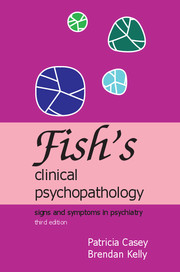Book contents
- Frontmatter
- Contents
- The authors
- Preface
- 1 Classification of psychiatric disorders
- 2 Disorders of perception
- 3 Disorders of thought and speech
- 4 Disorders of memory
- 5 Disorders of emotion
- 6 Disorders of the experience of self
- 7 Disorders of consciousness
- 8 Motor disorders
- 9 Personality disorders
- Appendix I Psychiatric syndromes
- Appendix II Defences and distortions
- Index
1 - Classification of psychiatric disorders
Published online by Cambridge University Press: 15 February 2018
- Frontmatter
- Contents
- The authors
- Preface
- 1 Classification of psychiatric disorders
- 2 Disorders of perception
- 3 Disorders of thought and speech
- 4 Disorders of memory
- 5 Disorders of emotion
- 6 Disorders of the experience of self
- 7 Disorders of consciousness
- 8 Motor disorders
- 9 Personality disorders
- Appendix I Psychiatric syndromes
- Appendix II Defences and distortions
- Index
Summary
Any discussion of the classification of psychiatric disorders should begin with the frank admission that the definitive classification of disease must be based on aetiology. Until we know the cause of the various mental illnesses, we must adopt a pragmatic approach to classification that will best enable us to care for our patients, to communicate with other health professionals and to carry out high-quality research.
In physical medicine, syndromes existed long before the aetiology of these illnesses were known. Some of these syndromes have subsequently been shown to be true disease entities because they have one essential cause. Thus, smallpox and measles were carefully described and differentiated by the Arabian physician Rhazes in the 10th century AD. With each new step in the progress of medicine, such as auscultation, microscopy, immunology, electrophysiology, etc., some syndromes have been found to be true disease entities, while others have been split into more discrete entities and others jettisoned. For example, diabetes mellitus has been shown to be a syndrome that can have several different aetiologies. On that basis the modern approach to classification has been to establish syndromes in order to facilitate research and to assist us in extending our knowledge of them so that ultimately specific diseases can be identified. We must not forget that syndromes may or may not be true disease entities and some will argue that the multifactorial aetiology of psychiatric disorder, related to both constitutional and environmental vulnerability, as well as to precipitants, may make the goal of identifying psychiatric syndromes as discrete diseases an elusive ideal.
Syndromes and diseases
A syndrome is a constellation of symptoms that are unique as a group. It may of course contain some symptoms that occur in other syndromes also, but it is the particular combination of symptoms that makes the syndrome specific. In psychiatry, as in other branches of medicine, many syndromes began as one specific and striking symptom. In the 19th century, stupor, furore and hallucinosis were syndromes based on one prominent symptom. Later, the recognition that certain other signs and symptoms co-occurred simultaneously led to the establishment of true syndromes. Korsakoff's syndrome illustrates the progression from symptom to syndrome to disease. Initially, confabulation and impressibility among alcoholics were recognised by Korsakoff as significant symptoms.
- Type
- Chapter
- Information
- Fish's Clinical PsychopathologySigns and Symptoms in Psychiatry, pp. 1 - 13Publisher: Royal College of PsychiatristsPrint publication year: 2007



